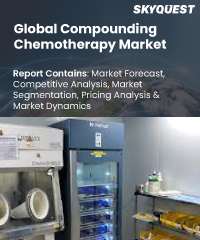
Report ID: SQMIG35A2813
SkyQuest Technology's Compounding chemotherapy market size, share and forecast Report is based on the analysis of market data and Industry trends impacting the global Compounding Chemotherapy Market and the revenue of top companies operating in it. Market Size Data and Statistics are based on the comprehensive research by our Team of Analysts and Industry experts.
Global Compounding Chemotherapy Market size was valued at USD 5.78 billion in 2023 and is poised to grow from USD 6.15 billion in 2024 to USD 10.1 billion by 2032, growing at a CAGR of 6.4% during the forecast period (2025-2032).
The global compounding chemotherapy market is witnessing significant expansion driven by several key factors. The increasing incidences of cancer and the continuous advancements in pharmaceutical compounding technologies play pivotal roles in fueling market growth. The rising geriatric population, more susceptible to cancer, further contributes to the expanding market as personalized treatment becomes increasingly vital.
Despite these growth drivers, the market faces certain constraints, including stringent regulatory requirements and safety concerns associated with compounding chemotherapy, underscoring the importance of compliance and patient safety. Conversely, there are promising opportunities on the horizon, such as the ongoing development of innovative compounding technologies and the increasing adoption of precision medicine approaches.
REQUEST FOR SAMPLE
Compounding Chemotherapy Market size was valued at USD 5.33 Billion in 2023 and is poised to grow from USD 5.6 Billion in 2024 to USD 8.32 Billion by 2032, growing at a CAGR of 5.08% during the forecast period (2025-2032).
The competitive environment of the global Compounding Chemotherapy market is dynamic and characterized by the presence of a mix of well-established brands, emerging players, and niche producers. Innovation is a key competitive factor. Leading brands invest in research and development to introduce new flavors, packaging formats, and health-focused variations to cater to changing consumer preferences. They often set the trends in the industry. 'Pfizer Inc. (United States) ', 'Novartis International AG (Switzerland) ', 'Roche Holding AG (Switzerland) ', 'Eli Lilly and Company (United States) ', 'Bristol Myers Squibb Company (United States) ', 'Merck & Co., Inc. (United States) ', 'Johnson & Johnson (United States) ', 'Sanofi S.A. (France) ', 'AstraZeneca PLC (United Kingdom) ', 'Takeda Pharmaceutical Company Limited (Japan) ', 'AbbVie Inc. (United States) ', 'Teva Pharmaceutical Industries Ltd. (Israel) ', 'Amgen Inc. (United States) ', 'Bayer AG (Germany) ', 'Gilead Sciences, Inc. (United States) ', 'Celgene Corporation (United States) ', 'Biogen Inc. (United States) ', 'Astellas Pharma Inc. (Japan) ', 'Daiichi Sankyo Company, Limited (Japan) ', 'Regeneron Pharmaceuticals, Inc. (United States)'
The transition towards personalized medicine presents a substantial opportunity for the compounding chemotherapy market. With a growing acknowledgment among healthcare providers regarding the significance of individualized treatment strategies, there is a notable surge in the demand for customized chemotherapy medications. Compounding chemotherapy uniquely positions itself to capitalize on this trend by offering the capability to formulate tailored therapies aligned with patient-specific factors. These factors include considerations such as genetic profiles, disease characteristics, and individual responses to treatment. By facilitating the creation of bespoke medications, compounding chemotherapy addresses the evolving paradigm in healthcare, where personalized approaches are increasingly recognized as essential for optimizing treatment outcomes.
Pharmacogenomics constitutes the study of how an individual's genetic composition influences their response to medications. This field delves into the intricate interplay between genetic variations and the effects they exert on drug metabolism and efficacy. The insights gained from pharmacogenomic studies empower healthcare providers to fine-tune treatment strategies, aiming to optimize outcomes for individual patients. In the realm of compounding chemotherapy, the integration of pharmacogenomic information becomes particularly valuable. Leveraging this knowledge, compounding chemotherapy can tailor medications to align with a patient's unique genetic profile. By doing so, healthcare providers can enhance treatment effectiveness while minimizing the risk of adverse effects.
In 2023, North America stands as the dominant market for compounding chemotherapy, holding a substantial share of 45.80%. This regional leadership is attributed to several key factors, including the high prevalence of cancer, which underscores the pressing need for effective treatment solutions. Additionally, there is a growing demand for personalized cancer care, aligning with the trend toward tailored therapeutic approaches. The preference for compounded chemotherapy over commercial alternatives further contributes to the region's market prominence.
Want to customize this report? This report can be personalized according to your needs. Our analysts and industry experts will work directly with you to understand your requirements and provide you with customized data in a short amount of time. We offer $1000 worth of FREE customization at the time of purchase.
Feedback From Our Clients

Report ID: SQMIG35A2813
sales@skyquestt.com
USA +1 351-333-4748